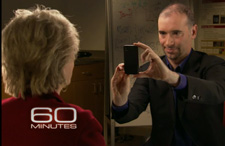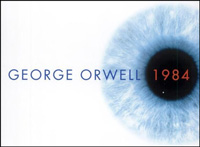redo Jump to...
print Print...
 (from CBS News) – The odds are you are not just a face in the crowd any longer. Even if your picture isn’t plastered all over social networking and photo-sharing sites, facial recognition technology in public places is making it harder if not impossible to remain anonymous. Lesley Stahl [of CBS’s “60 Minutes”] reports on the new ways this technology is being used that even has one of its inventors calling it too intrusive. Her 60 Minutes report [was] broadcast Sunday, May 19.
(from CBS News) – The odds are you are not just a face in the crowd any longer. Even if your picture isn’t plastered all over social networking and photo-sharing sites, facial recognition technology in public places is making it harder if not impossible to remain anonymous. Lesley Stahl [of CBS’s “60 Minutes”] reports on the new ways this technology is being used that even has one of its inventors calling it too intrusive. Her 60 Minutes report [was] broadcast Sunday, May 19.
Professor Alessandro Acquisti of Carnegie Mellon, who researches how technology impacts privacy, stunned Stahl with an experiment. He photographed random students on the campus and in short order, not only identified several of them, but in a number of cases found their personal information, including social security numbers, just using a facial recognition program he downloaded for free. Acquisti says smart-phones will make “facial searches” as common as Google searches in the future. And nearly everybody can be subject to such prying, even those who are careful about their Internet use.
“One of the participants, before doing the experiment, told us, ‘You’re not going to find me because I’m very careful about my photos online.’ And we found him,” says Acquisti, “Because someone else had uploaded a photo of him.”
Companies are beginning to use facial recognition technology to improve business. National retailers are installing cameras, some in store mannequins, to learn more about customers, while entities like malls can put cameras in digital billboards that recognize the age and gender of their shoppers and tailor ads to them on the spot.
At the cutting edge of the technology is a system now in testing called Facedeals, which is demonstrated for Stahl at a restaurant. Facial recognition technology quickly identified her and links up to her Facebook “likes” for the information it needs to instantly offer her a deal on her favorite beverage. The offer pops up on her cell phone within seconds of entering the restaurant.
To be clear, Stahl has to “opt in,” or give permission for her data to be retrieved by Facedeals, developed by marketing firm Redpepper. But the fear is as facial recognition gets better and more in use by commercial entities, it will increasingly track us without our knowledge or consent. “What’s unique about face recognition is the fact that you can do it surreptitiously [secretly], from a distance, and continually,” explains Joseph Atick, one of the pioneers in developing facial recognition. Two decades ago, as a young scientist, he helped make the technology work. Now it gives him pause. “Big Brother is no longer big government; Big Brother is big business.”
Atick believes the commercial use of facial recognition technology should be regulated, as the current lack of laws could lead to an infringement of people’s privacy. “My identity, my faceprint should be recognized as my property. My face is as important as my financial records, as my health records. It’s very private to me,” Atick tells Stahl.
Reprinted here for educational purposes only. May not be reproduced on other websites without permission from CBS News. Visit the website at cbsnews.com.
Questions
1. What type of research does Professor Alessandro Acquisti of Carnegie Mellon do?
2. How did Professor Acquisti demonstrate the use of facial recognition technology to CBS’s Lesley Stahl?
3. a) How was one participant, who didn’t believe Prof. Acquisti would find his information because he is very careful about his photos online, found by Prof. Acquisti?
b) Did you know you could be recognized by having your photo on a friend’s facebook page?
4. How are companies using facial recognition technology to improve their business?
5. Re-read para. 5-6. Do you think the use of Facedeals will be good/helpful for you? for society? Explain your answer.
6. In para. 6 the reporter states: “But the fear is as facial recognition gets better and more in use by commercial entities, it will increasingly track us without our knowledge or consent.”
a) Do you think most people will care? Explain your answer.
b) Do you think people should care about the complete loss of privacy? Explain your answer.
7. Joseph Atick, one of the pioneers in developing facial recognition believes the commercial use of facial recognition technology should be regulated, as the current lack of laws could lead to an infringement of people’s privacy.
a) Do you agree with Mr. Atick? Explain your answer.
b) Do you think a government agency would do a good job regulating facial recognition technology?
8. Are you familiar with the term “Big Brother”? Read the “Background” below. Do you think facial recognition technology is a type of “business Big Brother”? Explain your answer.
9. Just because a technology can be created to do something successfully, should it always be done? If so, why? If not, when should it not be used?
Background
- Big Brother is a fictional character in George Orwell’s novel Nineteen Eighty-Four. He (Big Brother) is the dictator of Oceania, a totalitarian state where the ruling Party wields total power for its own sake over the inhabitants.
- Orwell’s novel Nineteen Eighty-Four was published in 1949.
- In the society that Orwell describes, everyone is under complete surveillance by the authorities, mainly by telescreens.
- The people are constantly reminded of this by the phrase “Big Brother is watching you,” which is the core “truth” of the propaganda system in this state.
- Since the publication of Nineteen Eighty-Four, the term “Big Brother” has entered the lexicon as a synonym for abuse of government power, particularly in respect to civil liberties, often specifically related to mass surveillance. (from wikipedia)
Daily “Answers” emails are provided for Daily News Articles, Tuesday’s World Events and Friday’s News Quiz.




